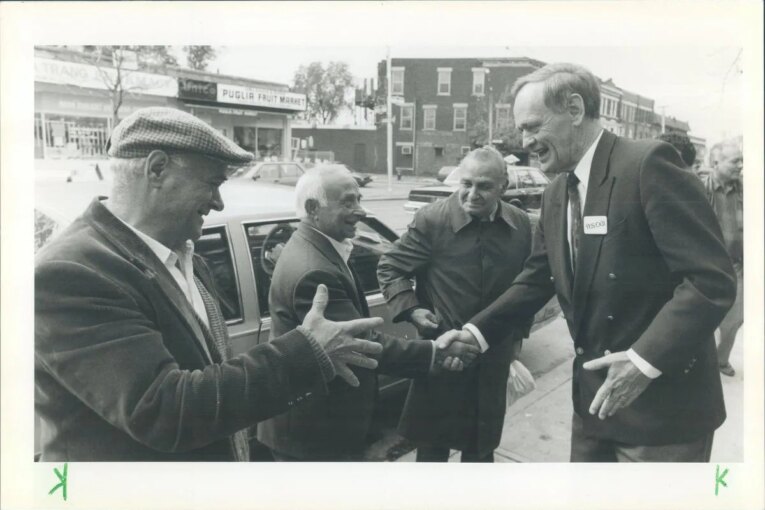
It was a glorious day at the SkyDome in late October 1992, as Blue Jay fans convened to celebrate the team’s first World Series victory. But when Premier Bob Rae took his turn to address the Jays faithful, the boos began.
The reason each person in the crowd jeered Rae couldn’t be known, but at the time an unpopular national deal was being brokered by the country’s politicians, the Charlottetown accord, and public sentiment was not on the side of the country’s elected officials. Rae was a leading negotiator of the accord.
Pitched as a rejigging of Canada’s Constitution in consultation with the provinces that would settle some of the country’s long-standing issues, such as whether Quebec would enjoy “distinct society” status, the accord was rejected by Canadian voters.
But, for a time, it dominated the country’s political landscape.
Wednesday marks three decades since the accord was voted down with only Ontario, Newfoundland, P.E.I., the Northwest Territories and New Brunswick voters approving it. British Columbia came out the hardest against it, with 67 per cent of voters rejecting the accord.
The front page of the Star the day after the referendum featured quick quotes from Canada’s political leaders. Prime Minister Brian Mulroney lamented, “the solutions we thought we had found … are now lost.”
But the paper also included two comments from regular citizens serving as a reminder of the public sentiment at the time, and shows it wasn’t just fans out to celebrate the Jays who weren’t happy with the accord.
“I don’t believe in our political leaders,” said Harold Gramolini from North York. “I don’t believe Brian Mulroney that man’s as crooked as a mare’s hind leg.”
Katrina Talbot in Halifax said: “They’re asking about 50 questions and you’re only allowed one answer. That was a colossal mistake.”
Rae, who is now Canada’s ambassador to the UN, said in the past he wasn’t bothered much by the boos, but the unpopularity of the attempt to change the bedrock of Canada’s democracy lingers.
Thirty years later Ian Peach, a constitutional scholar who negotiated for Yukon during the accord, said it was ultimately led to its demise by the complications around it and the dislike of Mulroney. Mulroney’s Progressive Conservative party was wiped out during the following year’s election after he stepped down.
The Charlottetown accord rose from the ashes of the also-doomed Meech Lake accord that preceded it with similar objectives. Peach said Meech Lake was too focused on Quebec’s interests and Charlottetown was meant to offer more to the rest of the country to hopefully gain popularity, including more autonomy for Indigenous people.
It didn’t work, and part of the reason was a lack of engagement from Canadians.
“The truth of the matter is we scrambled like mad people to build a legal text that I suspect about three people in the country actually read,” he said. “I also think that the political rhetoric around the Charlottetown accord had a significant impact on voting results.”
Gimmicks like Mulroney’s speech, where he ripped a piece of paper in half to illustrate how not voting for it would rip the country in half, didn’t sit well with people, Peach said.
Jonathan Wilkinson, the current federal natural resources minister, worked as an adviser to the Saskatchewan government. Wilkinson recalled the public anger about the accord he saw first hand at a town-hall meeting during a trip to the interior of B.C.
“It was frightening,” Wilkinson recalled this week. “Like I literally was afraid because there were a number of folks that were just so angry about Charlottetown. I just couldn’t understand it at the time.”
At times, Wilkinson said, he wonders whether that frustration was a preview of the same type of frustration and anger simmering today in Canada, three decades later.
“I do think it actually is some of this frustration with whether it’s elites or that they feel like the country is not working for them, or that it’s about values that people outside of these areas share,” he said. “But there was real anger. … And so perhaps we should have taken more notice.”
The backlash against politicians continued into the polls, said another analyst.
Nelson Wiseman, a professor emeritus in political science at the University of Toronto, said the political class was “slapped down” with the results of the referendum, and consequently talk of changing the Constitution stopped.
But the country has still accomplished some of the ideas in the accord without passing it. Quebec, for example, has greater control over immigration to the province. The prospect of changing the Constitution to get such changes created more issues as provinces sought their own interests.
“If you read the Charlottetown accord itself, it’s a dog’s breakfast,” Wiseman said. “It promises everything to everybody and is full of contradictions.”
While the accord promised greater sovereignty for provinces, he said it also held the Constitution to be supreme, pointing out they are two competing ideas.
Peach believes the country would be a different place had it been passed, saying that the accord would have been particularly helpful for Indigenous communities.
He said the citizenry sometimes may need to revise the Constitution in order to modernize the country, but after the Charlottetown accord it became more difficult for those in government to broach it.
“We’ve lost that for the last 30 years,” he said. “Our political leadership is petrified of even mentioning the Constitution.”
You can read more of the news on source



